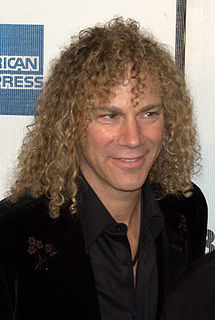A Quote by Marilyn Hacker
The pull between sound and syntax creates a kind of musical tension in the language that interests me.
Related Quotes
Desire means you are dragged out of the moment; that creates a tension, that creates anxiety, that creates hope. And then finally hope turns sour, becomes frustration. Each hope leads you into anguish. Buddha calls it the only impurity. Cut the roots of desire, live in the moment so totally, pull yourself out of the past and don`t project yourself into the future. Let this moment be all and all. And your life will have such a purity, such a crystal-clear consciousness that right now you cannot imagine.
Rather than thinking of sound and sense in my essays as two opposing principles, two perpendicular trajectories, as they are often considered in conversations around translation, or even as two disassociated phenomena that can be brought together to collaborate with more or less success, I think of sound as sense. Sound has its own meaning, and it's one of the many non-semantic dimensions of meaning in language. I want to emphasize is the formal dynamic between language-as-information and language-as-art-material.






































